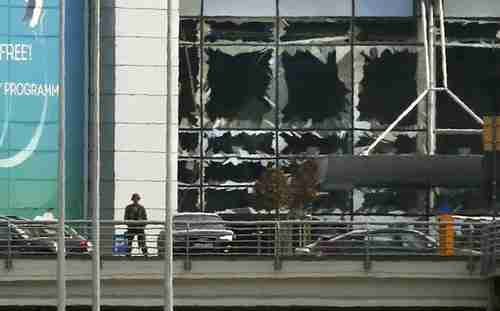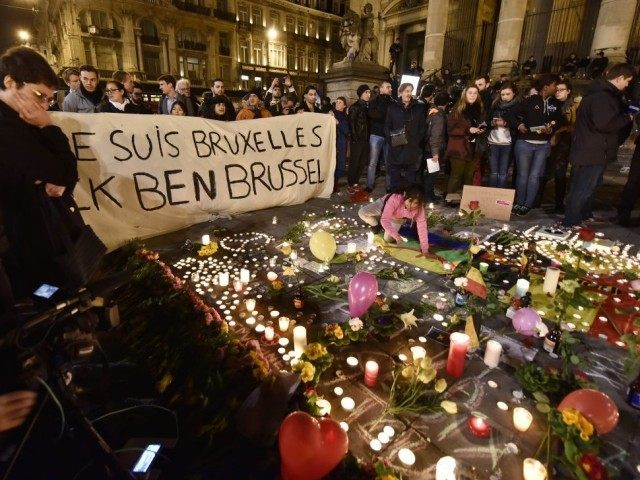This morning’s key headlines from GenerationalDynamics.com
- Generational Dynamics view of Brussels terror attack
- Gone With The Wind
Generational Dynamics view of Brussels terror attack

Aftermath of Tuesday’s terror attack in Brussels
The so-called Islamic State (IS or ISIS or ISIL or Daesh) has claimed responsibility for a series of bombings in Brussels, Belgium, that killed 31 people and wounded 230. There were two explosions at the American Airlines terminal of the Brussels airport at around 8 am local time, and another explosion at a nearby Metro station in central Brussels. Brussels is capital city of the European Union, and one attack occurred within sight of the European Commission building, so the symbolic nature of the attack is obvious.
For me, and for regular readers of Generational Dynamics World View, Tuesday’s terror attack in Brussels was not a remarkable or unusual event. In fact, looking at the bigger picture, it was just the latest in a string of similar attacks.
Last weekend, there was a major suicide bombing attack in Istanbul Turkey, and this followed a terror attack in Ankara two weeks ago, another one three weeks ago, and another one in October. Egypt has been suffering numerous terror attacks including, most spectacularly, a Russian passenger plane blown out of the sky over Sinai last year. Pakistan has had so many terror attacks that many are too commonplace to report. Six of the world’s 10 deadliest terrorist attacks of 2015 took place in Africa, in faraway places with such strange-sounding names like Nigeria, Cameroon, Kenya, and Egypt, with smaller attacks in Algeria, Niger, Burkina Faso and Mali.
Generational Dynamics looks at this situation from a global point of view, instead of just a European or American point of view. And from a global point of view, there are going to be three or four major terror attacks every month, and they will be scattered around different countries and continents.
And that does not count the countries at war, like Syria, Iraq and Afghanistan. As I’ve written many, many times, there is no Muslim war against the West. There is a major war, or several wars, of Muslims against Muslims. The number of Westerners killed by Muslims is minuscule compared the tsunami of Muslims being killed by other Muslims. As horrific as the attacks in Brussels and other places are, they are collateral damage to the real wars going on: Muslims against Muslims.
Much of this comes from Syria, as I’ve written many times before. The amount of damage that Syria’s sociopathic Shia/Alawite president Bashar al-Assad has done to the world, with the support and help of Russia’s Vladimir Putin and Iran’s Seyed Ali Khamenei, is almost beyond belief. By treating peacefully protesting Sunnis as cockroaches to be exterminated, al-Assad has created a conflict like no other seen in decades, with millions of refugees pouring into other countries and Europe.
Thanks to al-Assad, Putin and Khamenei, there are now 30,000 jihadist fighters from 86 countries that have come to Syria, first to join the rebels fighting al-Assad, then to join the al-Qaeda linked Jabhat al-Nusra (al-Nusra Front), then the so-called Islamic State (IS or ISIS or ISIL or Daesh), according to estimates by the left wing Center for American Progress.
Of those 30,000 jihadists from 86 countries, 5,000 are from European countries, and are citizens of European countries, probably having been born in a European country, and so are free to move around Europe as they wish. On a per-capita basis, Belgium has the largest share of its Muslim population leave to fight in Syria than any other Western country.
Now, it is probably not correct to say that these 5,000 people are all jihadists. We know that many people who go to Syria come back because they learn that they do not want to be any part of ISIS or other jihadist group, and do not wish to be suicide bombers or any kind of bomber. But probably at least a few hundred have been sufficiently radicalized that they are willing to conduct terror attacks. There may be more terrorist attacks in Belgium. So some of these people are going to conduct terror attacks, and there is no way to stop it.
About 30,000 Europeans die in traffic accidents each year, far more than have died as victims of terrorist attacks, at least so far. That comparison may not help much in solving the problem, but it might help you understand how to accept the reality of what’s going on. Expatica Belgium and Washington Times and Center for American Progress
Gone With The Wind
Listening to Tuesday’s broadcast coverage of the Brussel’s terror attack, I heard one woman say the following:
I can hardly wait for all of this to be over, and for things to return to normal, the way they used to be.
She may have been thinking of the 1990s, when there were no existential threats, and there was plenty of money around, thanks to the tech bubble.
Even terrorist acts did not seem so bad. Ireland’s “Provisional IRA” conducted multiple bombing attacks in Ireland and England, killing 1,800 people since the late 1960s into the 1990s. Britain listed the Provisional IRA as a terrorist group, but the U.S. did not. This massive string of terrorist attacks did not generate a fraction of the panic that attacks by al-Qaeda and ISIS have done. In fact, they were referred to by a fairly mild name, “The Troubles.”
There is a very good reason why attacks by the Provisional IRA did not raise anywhere near the same level of panic as ISIS attacks, and the reason is not because the IRA is Catholic and ISIS is Muslim.
The reason is that in the 70s, 80s, and 90s, the world was still being government by the GI Generation and Silent Generation, the survivors of World War II. Londoners in particular had suffered the equivalent of 9/11 three times a day for years, as Nazi bombers attacked every day. For these survivors, a car bombing or hotel bombing in London might be a horrific, bloody event, but it is nothing compared to what they lived through in the 1940s. Any WW II survivor still living today might feel the same way about the ISIS attacks — that they are nothing compared to the Nazi bombing of London.
So the woman who quoted above, saying that she wanted “for things to return to normal, the way they used to be” is dreaming of a time in the past when the Silent Generation was running the world, keeping things under control and in perspective.
But returning to the way things used to be is impossible, because the Silent Generation is gone. The Boomers and Gen-Xers of today do not have a fraction of their wisdom and skills, and their ability to govern the world.
A similar kind of transition occurred because of the American Civil War, and it is described by the title card of the 1939 movie about that transition:
There was a land of Cavaliers and Cotton Fields called the Old South… Here in this pretty world Gallantry took its last bow… Here was the last ever to be seen of Knights and their Ladies Fair, of Master and of Slave… Look for it only in books, for it is no more than a dream remembered. A Civilization gone with the wind…
Those who are wishing for a return to “normal,” for a return to the 1990s, should understand that the 1990s world is gone now, nothing more than a dream, a civilization that is gone with the wind. Council on Foreign Relations and Internet Movie Database
KEYS: Generational Dynamics, Brussels, Belgium, American Airlines, Russia, Vladimir Putin, Syria, Bashar al-Assad, Islamic State / of Iraq and Syria/Sham/the Levant, IS, ISIS, ISIL, Daesh, Jabhat al-Nusra, al-Nusra Front, Afghanistan, al-Qaeda, Iran, Seyed Ali Khamenei, Ireland, Provisional IRA, England, GI Generation, Silent Generation, Old South, Gone with the Wind
Permanent web link to this article
Receive daily World View columns by e-mail

COMMENTS
Please let us know if you're having issues with commenting.